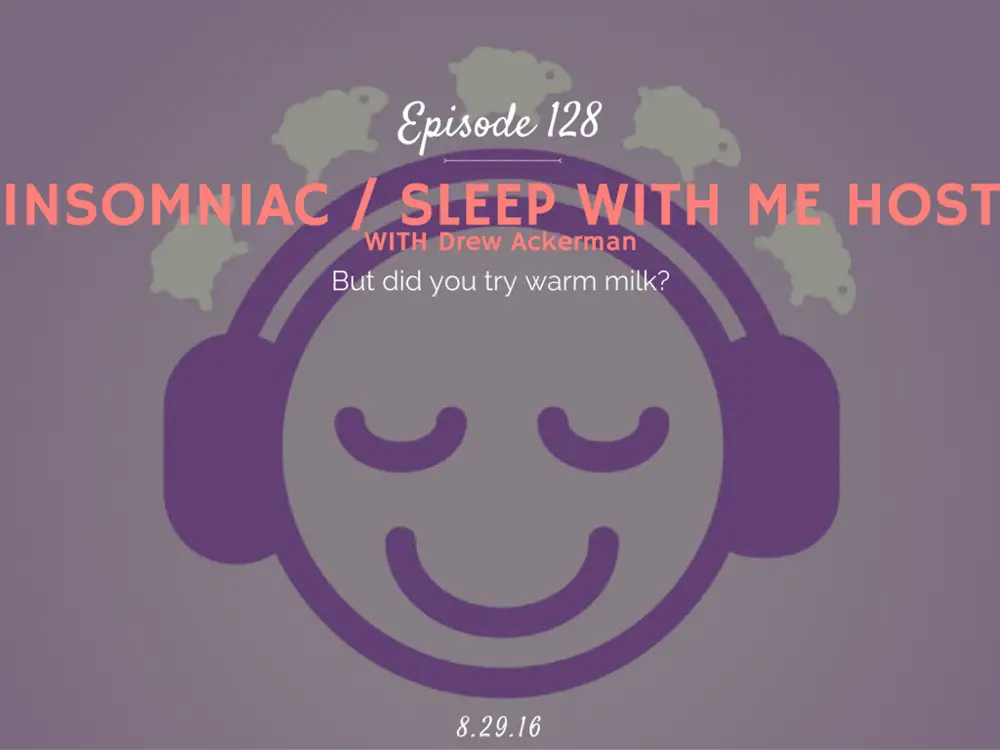“Ladies and gentlemen, boys and girls, and friends beyond the binary, it’s time…for ‘Sleep With Me,’ the podcast…that puts you…to sleep.” Scooter’s voice is gravelly and low against the soothing, vaguely hypnotic music accompanying the podcast intro. “We do it with a bedtime story, all’s you got to do is get into bed, turn out the lights, and press play. I’m gonna do the rest.”
Many readers may be familiar with this intro, subconsciously able to recite it from memory after hearing it night after night while drifting off. “Sleep With Me,” created and hosted by Drew Ackerman, known more widely as Dearest Scooter, is a hit podcast designed specifically to help listeners fall asleep. Ackerman utilizes “creaky, lulling, dulcet tones” as he masterfully tells dull, hour-long bedtime stories, three times a week.

Most podcasts strive to be engaging, but “Sleep With Me” tries for the opposite goal, as Ackerman works hard to produce easily ignorable content. If all goes well, the larger part of each episode is rarely consciously listened to. Why would one create a podcast intended to be slept through?
Ackerman has struggled to fall asleep since he was a young child, plagued by worries and feelings of self-doubt that kept him up for hours at a time. He often refers to such unpleasant anxieties as “Brain Bots,” tiny robots in one’s head who get muddled up and bother you when you just want to relax and drift off into dreamland. Ackerman designed the podcast as a way to distract the listener from their Brain Bots, either lulling them to sleep or keeping them company throughout the night.
According to Nitmun Verma, a national spokesperson for the American Academy of Sleep Medicine, the ideal bedtime story doesn’t build upon itself like the plot of a movie, instead it creates a series of parallel plot lines, which ultimately don’t connect. You don’t want to distract the brain to a point where the listener is actively enraptured with what’s happening, but the story needs to be engaging enough to be distracting in the first place.
“Sleep With Me” hits a perfect middle ground here. Ackerman’s technique is genius. All of his stories are at once creative, unremarkable and take on a diverse range of shapes. The “Superdull Stories” episodes are about a group of superheroes solving different problems, all of which are distinctly unfocused.
In some instances, Ackerman simply talks about an episode of Star Trek, walking the listener through portions of the script before backpedaling to supplement details and his subsequent wonderings about characters, actors, scenes and events. Ackerman will occasionally speak about things going on in his own life. In one episode he attempts to narrate a Florida sunset, but ends up describing the efforts he took to set up the recording equipment outside, and his worries about waking up his parents’ neighbors, all while the buzzing of insects hum distantly.
The subject of each episode alone isn’t what ultimately puts you to bed. What make each episode so effective are the lengths to which Ackerman goes to tune his speech and cadence to the right frequency. Ackerman begins each episode with a lengthy, fifteen-to-twenty minute introduction, in which he introduces the structure of the podcast.
He assures you you’re under no pressure to fall asleep, and you don’t have to listen to him. “I’m your bore-friend,” Ackerman jokes in multiple episodes, explaining his method of trying to create a safe space for you to fall asleep in, sending his voice across the deep dark night to keep you company for an hour, do with that what you will.

The introduction is comforting in its use of familiar repetition of words, phrases and tempo, functioning as a microcosm of an entire episode. Ackerman will speak for a little while about something on his mind before getting distracted and going on a tangent, moving slowly further and further away from where he started, until you’re having trouble remembering what he was even talking about in the first place, before finally looping back around.
Ackerman plays with this style throughout the entire podcast. He pulls listeners into longer and longer loops of thought, each less focused and more abstract than the last. By the time he returns to his original thread, it hardly matters, it’s already so dull, and he’ll soon embark on another journey of distraction, rocking listeners to slumber with just the pace of his stories. The podcast leads the restless brain in circles until it is too spent to continue following the threads of Ackerman’s ramblings.
Many experts on sleep claim that just distracting a racing mind is not a proper substitute for more comprehensive solutions to insomnia, such as limiting caffeine, alcohol, screen time or by implementing strategies to sooth anxious thoughts through list-making, meditation or designating the bedroom as a place for sleep and intimacy only.
Rafael Pelayo, a clinical professor at the Stanford Center for Sleep Sciences and Medicine said the podcast was at best, “a Band-Aid.” Milena Pavlova, a neurologist in the Division of Sleep and Circadian Disorders at Brigham and Women’s Hospital and Harvard Medical school, warned a listener that the podcast could be prolonging their slide into sleep, harming rest instead of helping.
No, the podcast is not a proper substitution for real insomnia treatment, but “Sleep With Me” isn’t intended to function as such. Ackerman insists listeners are under no pressure to fall asleep. “There’s not a right or wrong way to use the show,” he says. Remembering how thoughts of failure kept him up as a child, Ackerman believes that his podcast is most effective because it removes the opportunity for listeners to fail, as they might feel with a medicine or technique promised to help them snooze.
Regardless of the podcast’s technical classification, Ackerman’s work is undoubtedly effective. “Sleep With Me” is a kindly constructed nighttime companion, there to help you whether you toss and turn, wake with worry in the middle of the night, or just need a story to listen to. Don’t sleep on “Sleep With Me.” Or do!

















